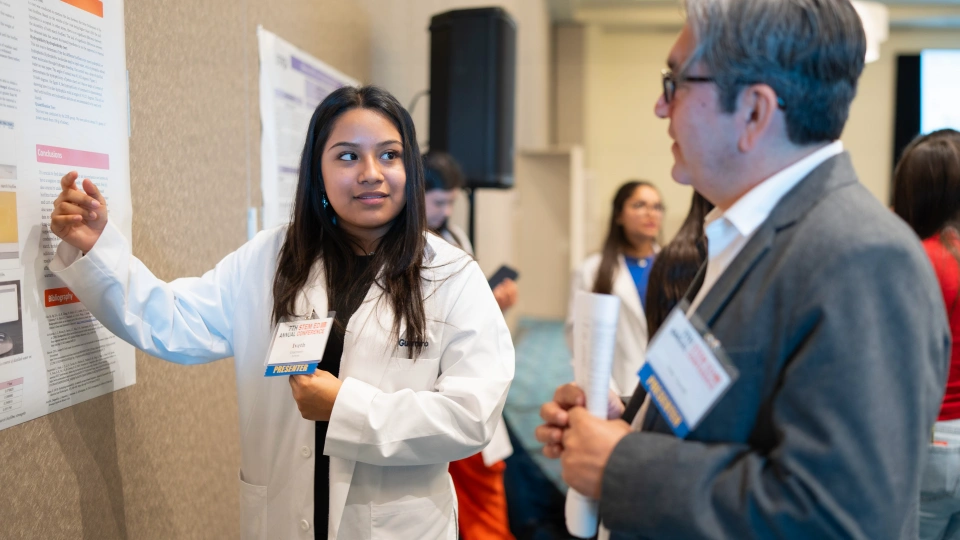- June 8, 2024
STEM Conference fosters international collaboration

By Jesús Alférez
RIO GRANDE VALLEY, TEXAS – UTRGV recently hosted the 7th Annual STEM Education Conference, with educators from around the globe exploring innovative practices in STEM education.
The event focused on transcending borders and fostering global collaboration.
Dr. Angela Chapman, associate professor of Science Education at UTRGV and conference advisory board member, said the theme this year centered around language.
“We focused on the notion that one’s native language holds equal value in STEM education,” she said. “Speaking different languages in STEM classrooms shouldn’t be viewed as an obstacle.”
The event, hosted at the Mission Events Center was simultaneously broadcast to multiple international sites, including UTRGV, Cinvestav Unidad Monterrey, and Universidad de Guadalajara (UDG). It was the first multi-site and multilingual synchronous conference at UTRGV.
Dr. James L. Moore III, assistant director for the Directorate for STEM Education at the National Science Foundation, delivered the keynote address, emphasized the importance of fostering a supportive environment for underrepresented groups in STEM on a global level.
“I think there’s a compelling case study here at UTRGV that I hope Texas recognizes for its uniqueness,” he said.
INTEGRATING GLOBAL VOICES
Sessions and activities focused on linguistic diversity, with multilingual workshops and presentations offering insights into the importance of integrating diverse languages into STEM education.
Dr. Lizette Ramos de Robles, professor and researcher in the Environmental Sciences Department at the University of Guadalajara in Mexico, and an advisory board member, highlighted the importance of international collaboration in promoting interdisciplinary analyses and forging global partnerships.
“Analyzing STEM education from sociocultural perspectives allows a better inclusion not only of participants, but also of themes, projects, visions and discussions that enrich the disciplines,” she said.
Dr. Alejandro Gallard, professor and Goizueta Distinguished Chair of Education at Georgia Southern University, also an advisory board member, emphasized the current lack of international representation in STEM education conferences.
“There is a lack of recognition of scholars from other countries within the research community in the United States and globally. This manifests itself when doors are closed to those who cannot communicate in English and whose ideas are not part of mainstream thinking … There are those who make it, but at what expense?”
Dr. Bhaskar Upadhyay, professor of STEM education and comparative and international development education at the University of Minnesota, emphasized the internationalization of STEM education and the urgent need to recognize and share differences and similarities.
“The exchange of ideas also means exchange of values and beliefs about language, culture and history,” Upadhyay said. “These exchanges make us richer and the world a better place for sustainable development for all.”
The conference, held Feb. 26-27, concluded with a session focused on student experiences and identities in STEM classrooms, and emphasized a strong commitment to inclusivity and global collaboration in STEM education.
Chapman thanked the conference’s advisory board members, including:
- Jennifer Adams, University of Calgary.
- Bindhu Alappat, St. Catherine University, Chicago.
- Daryl Chubin, author, codirector, Understanding Inventions.
- Gallard, Georgia Southern University
- Patricia Alvarez McHatton, Branch Alliance for Educator Diversity and founding dean of the UTRGV College of Education and P16 Integration.
- Volker Quetschke, UTRGV.
- Ramos de Robles, Universidad de Guadalajara.
- Upadhyay, University of Minnesota.
- Christopher Wright, Drexel University.

